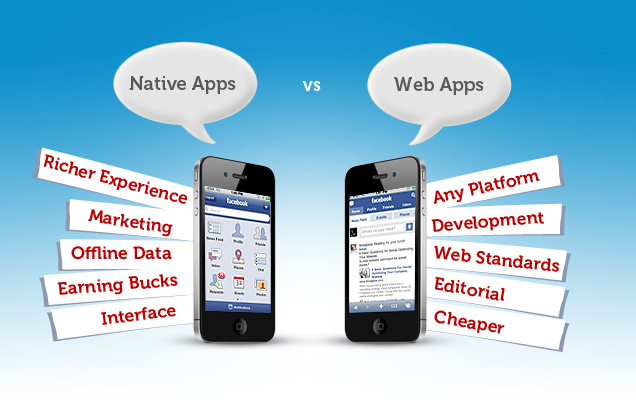
You have a brilliant idea of an app that is going to revolutionize the market. You are all set to develop it. Developing an app is an elaborate process that requires much planning. After the idea is conceived, developed and designed, the app needs to be deployed in the market. What is the first thing you should think about? Should you launch it as a native app or a mobile app?
First of all, let’s see what a native app is.
Native applications are made solely for a mobile or tablet. Users normally download these apps from an application store like the AppStore or Google Play. Examples are the Camera+ for iOS and KeePassDroid for Google Play. When we say mobile web apps, we mean that apps don’t need to be downloaded on the device, and can be accessed via the device’s web browser (Safari for iOS as default etc).
There is a native vs mobile debate in the developer world. Some say natives are better, while some argue that web apps are the future. Let’s categorize the apps on the basis of following things:
1. User Interface:
Companies like Facebook have both native and mobile apps and the interface is a bit different in both. It is to make the experience better for users. But mostly it is way more comfortable to use Facebook on its native app than on the browser. Native apps work faster because they are running on mobile’s own made version.
2. Development:
Mobile applications are developed in HTML5, CSS3, JavaScript and serve languages, whereas native apps are made in either Java (Android), Objective-C (iOS) or Visual C++ (Windows). The specific language of these apps make them easy to understand in a phone’s operating system, and doesn’t seem flawed. Native apps get full support from the app stores they are found on, which is a good thing since floating your boat in the app world by yourself isn’t a very easy task.
3. Internet Connection:
The worst thing about mobile apps is that they will completely refuse to function without an internet connection, while native apps still store the data from internet like airline apps do, and can still be of some use rather than total disappointment.
4. Quality of app
When you download the app from an app store, you are certain of its credibility, compared to when you use it on a browser. App stores help you find native apps and suggest same apps which is a good thing if you want to use it for long. Developers now have more tools to develop a native app with ease rather than deal with the many challenges of developing web apps. The easiest native app development starter kits are mentioned here. It focuses mainly on supporting the idea and going ahead to start an app on it. It is very good for businesses to start their own app with a little help by these development tips.
5. Version of apps
Some users can refuse to stay with app updates and keep on using the old version of app, whereas in mobile version everyone uses the same. It is sometimes annoying because new updates have a bug that is a hurdle in easy usage of app, native apps counter that since they perform on user reviews. Web apps are also not always secure and users hesitate to click on them.
6. Delivery Method:
The delivery method of a native app is both better for the developer and the user. Since the app performs on a standalone software, a user also understands its worth. Mobile apps are hard to locate on the browser, and the developer may face the bad luck of never being found again, unless they spend money on promotions. However, on a native app, the better the SEO, the better the ranking on an app store. Native apps also provide trusted usage if you allow them to use your camera, microphone or contact list. Mobile web apps have very limited scope.
7. Monetization:
Ad platforms specific for mobiles can bring in money for native apps, whereas web apps perform the old ritual of advertising on web through ads. Developers of native apps get the process of purchase done through the app store, and it is easy for users to buy apps through these stores because they place high trust levels on them. On the other hand, developing a web app means you handle the payment systems yourself and since users may not know you as a developer or business, they might never be comfortable on adding their credit card details for your web app at all. Native apps also get a lot of support from app business managing companies that deal solely with app developers and also develop apps.
The above were all the ways by which native apps are definitely a more secure investment for both the developer and the user. At the end of the day, what is the purpose of advancements in technology but to make everyone’s life easier?
0 Comment(s)